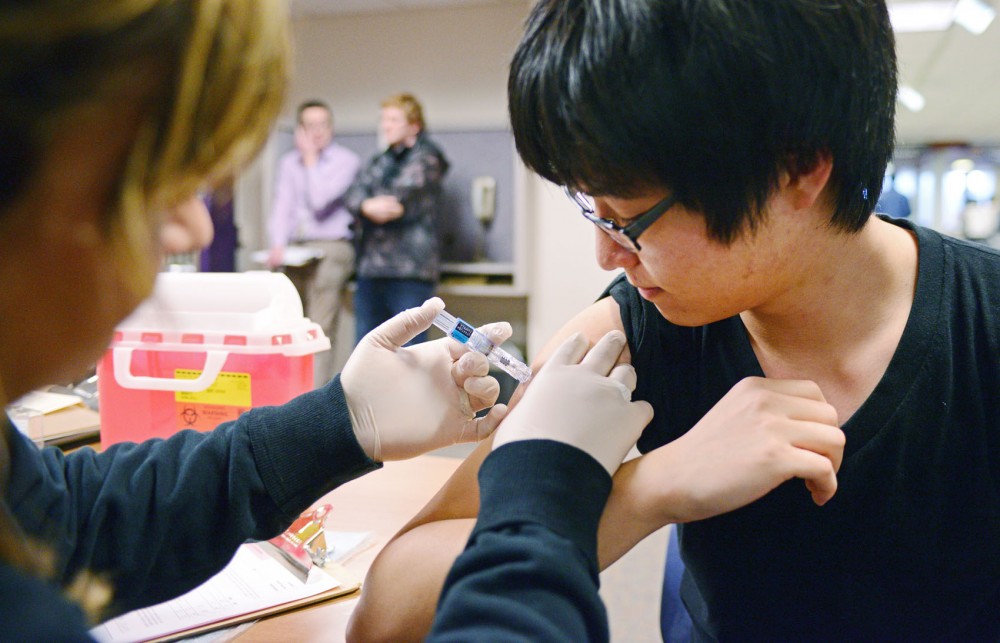The University of Minnesota and Boynton Health Service have taken strong measures in response to this year’s flu season, including implementing temporary sick policy changes and increasing flu shot clinic locations.
Like the rest of the state and U.S., Boynton has seen an increase in flu cases between Christmas and Dr. Martin Luther King Jr. Day compared to recent years.
Minnesota has had 1,842 confirmed hospitalizations due to the flu, and 60 flu-related deaths so far this season, according to the Minnesota Department of Health.
Nationwide, 18.8 people per 100,000 are being hospitalized, according to the Centers for Disease Control and Prevention. People aged 65 or older have a much higher rate of 82.1 hospitalizations per 100,000 people, while those between ages 18 and 49 have a lower rate of 7.3 per 100,000.
So far this flu season, Boynton has given 19,000 vaccinations, which is about 3,000 more than at the same time last year, said John Finnegan, dean of the School of Public Health.
Boynton still has about 4,000 flu vaccinations remaining.
“We are urging people to get vaccinated,” Finnegan said. “There’s still time.”
The East Bank Clinic is accepting walk-ins for flu shots from 10 a.m. to 3 p.m. through Friday, as well as a mass clinic Thursday that students can register for in advance online.
Vaccinations were also given out to students at five residence halls Monday night before classes started Tuesday.
Lesley Gray, a Boynton registered nurse who administers flu shots, said vaccinations were offered in residence halls because their close quarters make the flu easily spreadable.
Students and staff have been lining up for walk-in clinics in response to the flu epidemic.
Economics student Jun Li said he got the flu shot Friday because he saw a lot of his friends catching the flu.
“It looks horrible,” he said.
Ian Baebenroth, who works in Capital Planning and Project Management at the University, said he got a vaccination because so many people at work have been sick lately.
Finnegan said one of the reasons for the spike in flu cases this year could be related to how well the vaccine matches the main strains of flu.
The CDC told Finnegan that this year’s vaccine, developed over the past year, was a “fairly good match for the viruses circulating out there,” Finnegan said. “Obviously something got missed, because we’re seeing a higher spike than we would ususally see.”
Although the vaccine isn’t 100 percent effective, Finnegan said it’s “the best defense we have.”
He said that even if people still get the flu after receiving a vaccination, there is some indication that they might have a less severe case than if they never got the shot in the first place.
“It’s not perfect by any means,” Finnegan said, “but it’s all we’ve got going for us right now.” He said more funding is necessary to find more effective vaccines than are currently available.
In response to the epidemic, the University has made some changes to its sick policy for students who have flu symptoms, such as temporarily suspending the need for a doctor’s note if a student misses class. Also, students who miss the first day of class won’t lose their spot, said Senior Vice President for Academic Affairs and Provost Karen Hanson.
Students are returning from various parts of the country where there have been serious flu outbreaks, which Hanson said was another factor in the decision to make temporary policy changes.
She said she recommends students keep in touch with instructors through email to let them know they’ll be missing class.
The University made similar procedure suspensions during the 2009-10 school year when H1N1 was prevalent, Hanson said.
“We want students to stay healthy,” she said, “and if they get sick: stay home and drink lots of fluids and get plenty of rest.”















